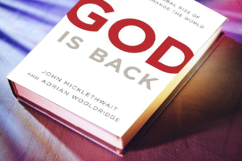
Does religion make you stupid? It looks like it, based on a study carried out by academics on both sides of the Atlantic, at the University of Missouri and Leeds Beckett University. Clicking through to the original research, the claim is made: 'We found that higher levels of religiosity (at national level) were associated with lower educational performance in science and mathematics.'
So there it is, researchers have evidence that performance in science in maths seems to be correlated with how religious a society is. The more heavily faith-fuelled a society is, the worse its citizens will perform in maths and science. On the surface this looks like a damning indictment of faith – another feather in the cap of the new atheists who will say, 'we told you so'.
Not so fast, though. A further look at the data throws up some other possible explanations. Most of the countries at the bottom end of the performance table (Iran, Saudi Arabia, Qatar) are repressive societies which prize submission to authority well above academic achievement. In contrast, those countries which were at the top tend to be Western democracies (Czech Republic, Japan, Sweden) which value educational attainment above uniformity of behaviour and submission to authoritarian government.
Now, it's true, of course, that many of those repressive regimes are religious in nature. It's impossible to discuss the lack of opportunity for women, religious minorities and other marginalised groups in Iran or Saudi Arabia without discussing their theocratic governments which restrict the rights and opportunities of their citizens thanks to their narrow and tyrannical religious ideology. In this case the prevalence of religion is obviously a large part of the problem.
But then turn to the top of the list again. The top 15 contains European countries or former European colonies like New Zealand and Hong Kong. The only two outliers are Vietnam and Japan.
So, 13 of the top10 have been significantly influenced by the Christian worldview and the reverence for science and maths that was brought about by Christian pioneers like Isaac Newton and Gottfried Leibniz during the Enlightenment.
We need to be careful not to over claim here. The high performance of Western nations is based on the fact that our post-enlightenment societies prize scientific achievement very highly. It also doesn't factor in that the riches the West stole from the rest of the world it colonised, that helped to facilitate much of the scientific 'progress' made here. A table like this is extremely narrow, too – it tells us nothing of the real values a county has – empathy, happiness and even love are nowhere to be seen here. These most important things are, of course, much harder to quantify.
Yet it also isn't surprising that many of the societies high up on the list are still, in some deep way, Christian. The Archbishop of Canterbury said this week in response to the terror attack on Westminster that the UK is still in a sense, Christian. He pointed to the 'deep values within our own society', owing to, 'a narrative that is within our society for almost 2000 years'.
The sense of discovery which powered the scientific revolution isn't the property of Christians but it is on display to this day in the post-Christian countries of Europe where we still yearn to understand more and more about creation.
All in all then, I'm not sure this new piece of research teaches us a great deal about faith, except that educational attainment is a good that every country should be striving for. Repressive regimes around the world should be ashamed that they are down at the bottom of the list and allow their people the freedom to enquire and discover the universe in the same way that the rest of us are free to do.

















